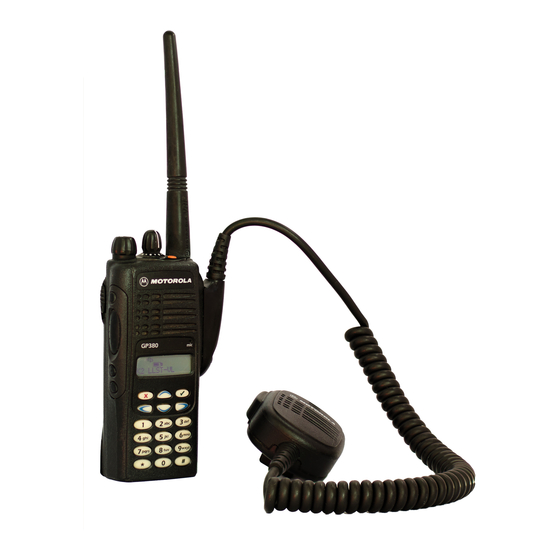Motorola GP series Informacje o usłudze - Strona 7
Przeglądaj online lub pobierz pdf Informacje o usłudze dla Dwukierunkowe radio Motorola GP series. Motorola GP series 30 stron. Professional radio
Również dla Motorola GP series: Instrukcja serwisowa (26 strony), Informacje o usłudze (24 strony), Informacje o usłudze (31 strony), Informacje o usłudze (43 strony), Podręcznik użytkownika (16 strony), Podręcznik (30 strony)

Controller Circuits
Conventional MDC
Conventional 5 Tone
Conventional 5 Tone
Privacy Plus
SmartZone
MPT
MPT
3.3
Real Time Clock
( Refer to Figure 1-3 and the Microprocessor schematic diagram )
Radios with displays support a Real Time Clock (RTC) module for purposes of message time
stamping and time keeping. The RTC module resides in the microcontroller.The clock uses a back-
up Lithium Ion battery for operating power when the primary battery is removed.
3.3.1
Circuit Description
The RTC module circuit, shown in Figure 1-3, is powered by the ModB/Vstby pin and PI6/PI7 from
the crystal oscillator circuit. A clock frequency of 38.4kHz from a crystal oscillator provides the
reference signal which is divided down to 1 Hz in the processor.
HC11FL0
MODA
MODB
PI6
PI7
As the RTC module is powered separately from the processor Vdd, the RTC is kept active through
the ModB / Vstby pin which provides the Lithium battery back-up power when the radio is switched
off.
Table 1-1 Radio Memory Requirements
RADIO
GP140
GP320, GP340
GP360, GP380
GP240, GP280
GP540, GP580
GP640, GP680
GP1280
FL401
C436
OUT
R420
38.4kHz
GND
IN
R426
C437
Figure 1-3 RTC Circuit
ROM (KB)
128K
512K
512K
512K
512K
512K
512K
Vddd
R461
C435
CR411
1
Q416
2
3
2
1
R462
R463
CR413
300
5
1
4
Q417
3
2
1
6
2
UNSWB+
SWB+
3
4
EXT RAM
EEPROM
(KB)
(KB)
-
8K
16K
16K
16K
16K
16K
16K
16K
16K
16K
16K
16K
16K
UNSWB+
U410
3.3V
2
3
VIN VOUT
C434
R460
5
4
R419
3
LI_ION
BOOT_CTRL
TP405
TEST_POINT
1-3
